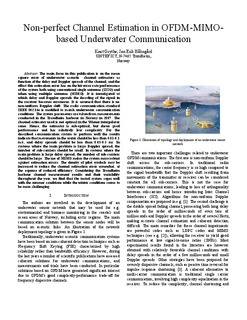| dc.contributor.author | Grythe, Knut Harald | |
| dc.contributor.author | Håkegård, Jan Erik | |
| dc.date.accessioned | 2017-02-21T08:28:45Z | |
| dc.date.available | 2017-02-21T08:28:45Z | |
| dc.date.created | 2015-09-24T20:08:56Z | |
| dc.date.issued | 2009 | |
| dc.identifier.citation | OCEANS 2009-EUROPE, 2009. OCEANS '09, Bremen 11-14 May, 2009 | nb_NO |
| dc.identifier.isbn | 9781424425228 | |
| dc.identifier.uri | http://hdl.handle.net/11250/2431538 | |
| dc.description.abstract | The main focus in this publication is on the mean square error of underwater acoustic channel estimators as function of the delay and Doppler spreads of the channel, and the effect this estimation error has on the bit error rate performance of the system both using conventional single antennas (SISO) and when using multiple antennas (MIMO). It is investigated at which delay and Doppler spreads the decoding of the signal in the receiver becomes erroneous. It is assumed that there is no non-uniform Doppler shift. The radio communication standard IEEE 802.16e is modified to match underwater communication conditions. The system parameters are taken from measurements conducted in the Trondheim harbour in Norway in 2007. The channel estimator used is not optimal in the Wiener interpolator sense. Hence, the estimator is sub-optimal, but shows good performance and has relatively low complexity. For the described communication system to perform well the results indicate that movements in the water should be less than 0.01-0.1 m/s, and delay spreads should be less than 0.05-0.5 ms. In systems where the main problem is large Doppler spread, the number of sub-carriers should be small. In systems where the main problem is large delay spread, the number of sub-carriers should be large. The use of MIMO makes the system more robust against estimation errors. The density of pilot symbols may be increased to reduce the channel estimation error somewhat, at the expense of reduced efficiency. Considering the Trondheim harbour channel measurement results and their variability throughout the year, we find that the tested system copes well with the summer conditions while the winter conditions seems to be more challenging. | |
| dc.description.abstract | Non-perfect channel estimation in OFDM-MIMO-based underwater communication | |
| dc.language.iso | eng | nb_NO |
| dc.relation.ispartof | OCEANS 2009-EUROPE, 2009. OCEANS '09, Bremen 11-14 May, 2009 | |
| dc.title | Non-perfect channel estimation in OFDM-MIMO-based underwater communication | nb_NO |
| dc.type | Chapter | nb_NO |
| dc.source.pagenumber | 1-9 | nb_NO |
| dc.identifier.cristin | 1271864 | |
| cristin.unitcode | 7401,90,22,0 | |
| cristin.unitname | Kommunikasjonssystemer | |
| cristin.ispublished | true | |
| cristin.fulltext | postprint | |
